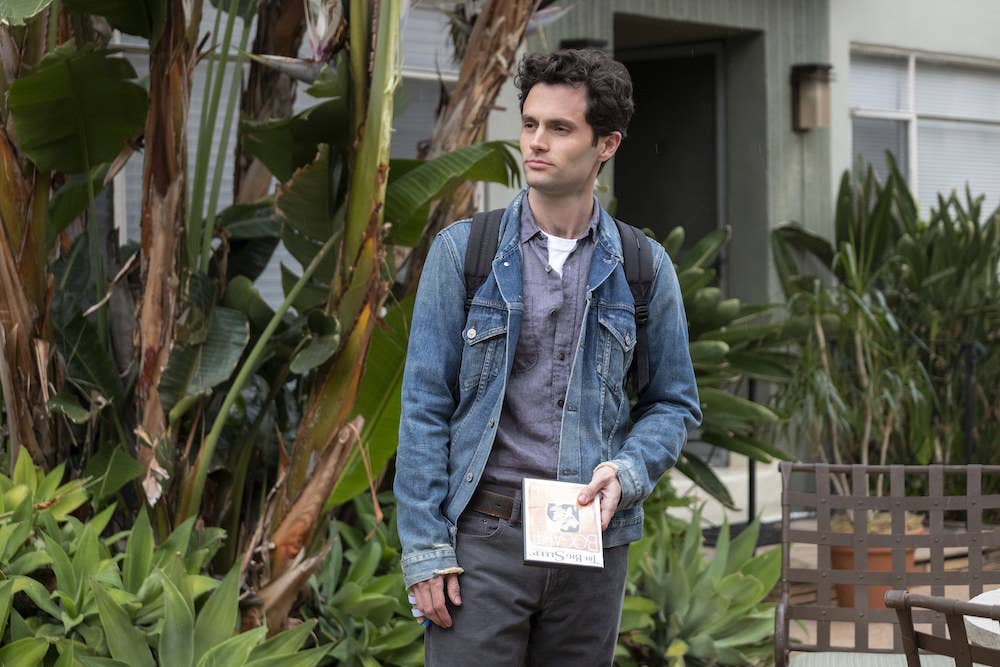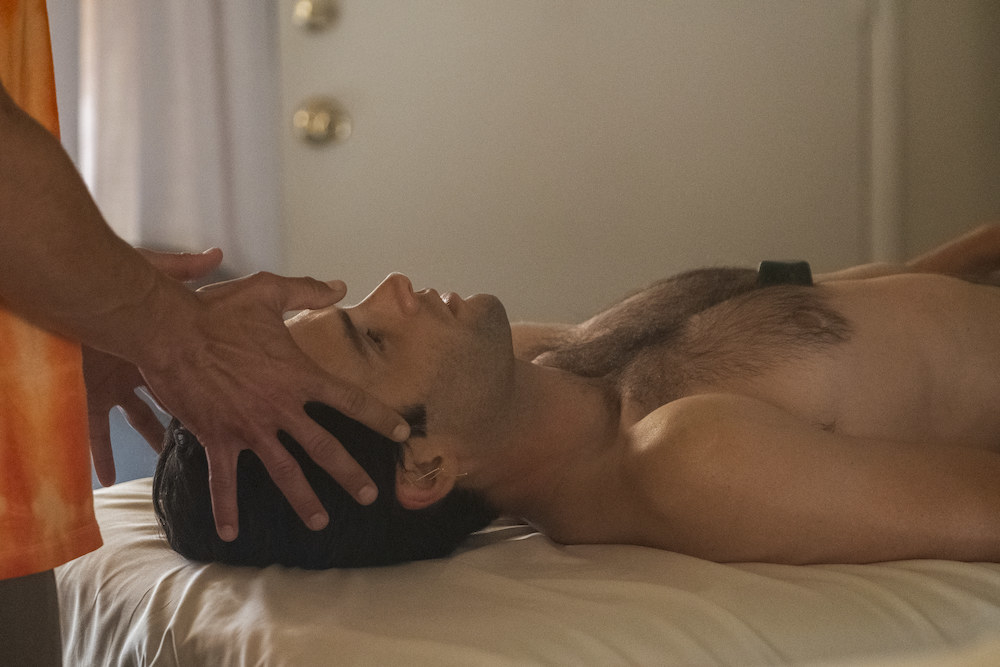
Midway through the second episode of the second season of You, Netflix’s thriller about a handsome sociopath who likes to stalk his love interests, the show’s main character, Joe Goldberg (Penn Badgley, all doe eyes and cheekbones), cries out despairingly, “I drove to the Valley for you!”
This moment is meant as a knowing wink, a little flirt with You’s Angeleno viewers, but it also serves to let us know that Joe has made the transition from the die-hard New Yorker we met in Season 1 — a man who once complained about having to follow a girl he’s stalking to Greenpoint — to a guy who finally understands what it means when someone says you’re gonna have to take the 101 to the 170.
More than that, though, this is the moment when You declares that it’s an LA show now. Its soapy satire is aiming to skewer the city’s vegans, desperate actors, and therapy devotees — just as it took aim at New York’s literary pretensions and self-centered heiresses in Season 1.
The team behind You was aware this would be a difficult feat to pull off. As the New York Times is reminded every time it tries (and fails) to cover Los Angeles, this city is hard to know, and its residents are heartily sick of being reduced to broad stereotypes.
“I feel like there’s a certain L.A. that gets portrayed in TV and film most of the time,” You’s executive producer Sera Gamble told the LA Times recently, “and we certainly start the season from the perspective of someone who’s looking at it that way.” So she and the rest of the You team tried to make sure that “as the season goes on, we start to peel back the layers and show you the stuff that’s really great here as well.”
They do a fair job of it — though having their LA native character Love Quinn (Victoria Pedretti) quote the late Pulitzer Prize–winning food critic Jonathan Gold on the subject of tacos isn’t exactly the kind of locals-only shibboleth that You seems to think it is. But on the whole, it’s hard to say that the wellness- and fame-focused portrayal of LA is any more of a caricature than the wealth and status–obsessed New York characters in Season 1.
Instead, what’s missing is an acknowledgment that for a millennial like Joe — a white guy who knows his Didion and doesn’t balk at the price of a green juice — moving between the two coasts wouldn’t actually be much of a culture shock. Between the totalizing sameness of social media, rising rents, and the increasing migration between the two cities as publishing and magazine budgets shrink and everyone tries to get a job in a writers room before the Golden Age of Television ends, the two cities once considered polar opposites are becoming more and more like each other as they both fill up with algorithm-approved chains that have nothing to do with either’s local culture.
Like most television, You is full of fantasy. Joe works what has to be an hourly wage job in one of the most expensive cities in the country, and he never seems to worry about making rent on his spacious Franklin Hills one-bedroom. But perhaps the greatest fantasy is the clear coastal distinction the show depicts, a distinction that in real life is fast fading away.

The first season of You follows Joe as he follows a beautiful blonde MFA student named Guinevere Beck (Elizabeth Lail) around New York. The pair have a meet-cute in the bookstore where Joe works; she reads the kind of serious fiction they both approve of, and they bond by mocking a man buying a Dan Brown novel.
Joe feels certain that he and Beck are meant to be together — but first, he tells us in a voiceover, he has to do some research to make sure there aren’t any red flags. He’s been hurt before. So does what any responsible millennial does when they meet a likely lover: Joe googles her. He checks her Instagram and her Facebook.
And then he calls in a gas leak in Beck’s apartment, convinces the guy who comes to check it out that he’s her boyfriend, and uses the opportunity to go through her laptop and steal her underwear.
For a millennial like Joe — a white guy who knows his Didion and doesn’t balk at the price of a green juice — moving between the two coasts wouldn’t actually be much of a culture shock.
Beck is blissfully unaware of Joe’s creeping — and soon enough, the two are dating, with him working double time behind the scenes to ensure that every aspect of their relationship stays within his control. He kidnaps Beck’s startup bro fuck buddy and posts offensive, drug-addled missives on the guy’s Twitter to ensure that she cuts ties with him. Then he goes after her friend Peach Salinger (yes, that Salinger), who is — rightly, it turns out — suspicious of good ol’ Joe.
Beck’s MFA peers and her rich party girlfriends give You the opportunity to portray and then puncture a very particular slice of New York: a city where a student like Beck has to depend on her semi-estranged father for money for the McQueen scarves she gives as birthday presents to her unimpressed heiress gal pals; a place where aspiring writers insist that tomorrow they’re going to get a lot of work done but just, like, tonight they’re having drinks with the squad; and a place where a girl like Peach will try to smooth over an argument by throwing a party in order to introduce you to a well-known literary agent.
Beck and her friends are always trying to pretend to be cooler, happier, more carefree, and more interesting than they actually are. Joe, who doesn’t use social media, is happy to manipulate their desire to make their lives look impressive for his own ends. (Also, their geotagged Insta posts make his stalking easier.) New York is portrayed as a city of strivers and strugglers, where access to a certain kind of cultural power — a famous last name, a coveted first edition — is the local currency.
Los Angeles, by contrast, is presented as a city driven by an appetite of all kinds. Joe moves there to hide out from the ex-girlfriend he almost killed before he got involved with Beck (whom he actually kills at the end of Season 1). Soon after arriving, Joe steals the carefully curated nonidentity of a guy named Will Biddleheim and starts working in the books section of an organic market called Anavrin (“Nirvana” backward) and dating the owners’ daughter, Love.
It’s Love who serves as Joe’s guide to Los Angeles (and who serves up that J. Gold line): She introduces him to the city via the search for his “perfect bite,” taking him on a tour of food trucks and strip malls (which, sorry, but: yawn! It’s 2020, I’m not impressed that she knows about food trucks, and Joe shouldn’t be either).
Everyone in You’s LA thinks obsessively about bodies and what they put in them: At work, Joe-as-Will is encouraged to create a display celebrating bisexual pescatarian authors; Love’s addict brother Forty, is always drinking green juices — so if he orders Del Taco, she knows he’s heading toward a relapse. There are the borderline incomprehensible conversations about blood cleansing and the vatas.
But, really, what these people are hungry for is fame. Forty is convinced that he can make his distant parents love and respect him if he can just get a feature off the ground; a comedian named Henderson preys on young women trying to get their start in the industry. New York’s power structures, as far as You is concerned, are centered on money, lineage, and heritage; in LA, it’s all about making a name for yourself — or at least making yourself an authentic and organic vegan snack.

The show’s portrayals of both cities can be broad, but that’s fine; You is not always committed to nuance. But it feels like a missed opportunity, or maybe just out of step with the era, to act like a New Yorker could drop himself into LA — especially the hip, affluent east LA neighborhoods Joe inhabits — and find himself completely out of his element.
The social media use, first of all, would be nothing but familiar; LA is just as full of digital posturing as New York. And this town is packed of writers who are, like, kind of working — I mean, they’re working on something. Sometimes. In fact, in all likelihood, Joe would run into an old acquaintance from either his bookstore days or Beck’s MFA circle within a week of starting to work retail in Echo Park: a playwright coming out west to do a couple of generals, or a magazine writer on assignment for a week or two.
He’d also be just as likely to end up eating food from a New York transplant chef as a homegrown talent: Love could easily take Joe to check out David Chang’s LA outpost, Majordomo, or the NoMad Hotel downtown; if they could be convinced to head west (worse than to the Valley, IMHO), there’s Roberta’s at Platform in Culver City.
LA is just as full of digital posturing as New York.
More than being like New York, though, Los Angeles is increasingly like an algorithm-approved collection of hip chains imported off the internet (or another millennial-cool city) and onto its streets. In Silver Lake, Joe could wander around the brand outposts that now dominate Sunset Junction (Warby Parker, Sweetgreen, Happy Socks, La Colombe, plus Tartine, which hails from San Francisco, and Intelligentsia, an ur-hipster coffee shop with roots in Chicago). Farther east, there’s APC and Aesop, with Blue Star Donuts (Portland-based), Ramen Tatsunoya (Kurume City, in Japan), feminist clothing brand Wildfang, and a Doc Martens store a little farther down the street.
Most of the independently owned businesses that remain on these blocks are scheduled for imminent demolition: a development group whose stated goal is “gentrifying neighborhoods of Los Angeles” is retenanting stretches of Sunset Boulevard in Silver Lake (which is already mostly occupied by first-wave gentrifiers), and Echo Park institution Taix will soon be reduced to an in-house bar and restaurant for a luxury apartment building. Which is probably better than the developers who kicked the Caribbean restaurant Cha Cha Cha out of its space entirely, demolished the building, and then used its name and neon sign on the condos they built in its place, apparently as a tribute to the neighborhood’s (um, very recent) history.
The “authenticity” that You wants to celebrate Los Angeles for having increasingly doesn’t exist anymore — certainly not in the neighborhoods where the show is set. It’s sweet to imagine LA as a place where everyone has the space to be themselves, a harmlessly charming land of sunshine and food trucks and good intentions, but it’s frustrating to see the texture of your city — its streets and landmarks — being thrown up onscreen as in-joke signifiers removed from the actual civic context within which they function.
I grew up in Los Angeles in the ’90s, years before Gold won his Pulitzer and people started taking the city even a little bit seriously; I never thought I’d see the day when I complained about a mostly positive media representation of LA. The creators of You did manage to avoid a lot of tired stereotypes — and for most of my life, someone recognizing Los Angeles as a beautiful, diverse city with a distinct culture felt like an impossible dream.
So it’s a particularly cruel irony that that recognition is coming just as that culture is disappearing, being driven out by sky-high rents on retail spaces and apartments alike. ●
